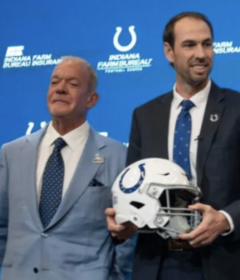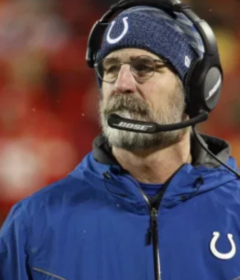Calinger: Psychological game underrated in NFL
By J.W. CALINGER
ISL Correspondent
Note: The author is a Pittsburgh Steelers fan and a former state champion journalist at Omaha North High School. He has been diagnosed with Asperger’s Syndrome, a form of autism that affects social interaction.
OMAHA, Neb. — We’re continuing to learn how important psychology is in football and other sports. Because of the macho culture, a critical draw for talent and fans, our scientific understanding, not only of the sport but of the players and how to motivate them has been way behind.
Some coaches understood the principles instinctively. Chuck Noll, Bill Belichick, and Tony Dungy have succeeded on a scientific, cerebral and – dare I say it? – gentle level in pro football, as Tom Osborne has done in college football and, in basketball, Phil Jackson and John Wooden have done as well. But, because coaches and players weren’t as willing to look at the psychology behind athletic performance as they are now, these coaches have been a minority and, no matter how successful and lauded they were, they were not highly imitated. As a result, teams have suffered, as has the quality of play in general.
Players, also, have suffered because the culture looks down on those who would see a therapist. Seeing a trainer is perfectly fine for an injury, but those with a mental weakness are encouraged more to suck it up than to have the weakness treated properly. We can see the negative effects of that culture any time a wide receiver has a monumental collapse off the field. Randy Moss could have had numbers comparable to Jerry Rice if he would have addressed his insecurity. Terrell Owens and Chad Ochocinco could have been up there if they had addressed their vanity.
Sure, people would have looked down on players in the short term for seeing a therapist, but if winning games can motivate the audience to forgive players for committing crimes, then it can motivate fans not only to look past the whole therapist deal, but even to accept it and imitate it for ourselves.
This wouldn’t be the first time people accept something as necessary that used to be considered sissy or effeminate. Believe it or not, drinking water or, especially, flavored sugar water, used to be forbidden on the sidelines as a mark of softness – but then the Florida Gators started outlasting their opponents after drinking a lab concoction during the games, and now all sorts of athletes drink Gatorade or a competing brand during competition. More and more of us are starting to understand that if we can accept highly aggressive means of winning, we can accept highly scientific ones – and, in fact, the latter are much more desirable and productive in the long term.
***
The Pittsburgh Steelers have a good psychological foundation, which is the biggest reason they’ve been so successful over the years. Their chief feature is stability. Since 1969, only three men have held the position of head coach and, except for a few transition years, we’ve seen four centers since 1976. We have a defensive coordinator who is in his 70s, but who may well be there for at least another half-decade (and who also has a moderate approach when coaching). The team have a philosophy of planning for the long term and making sure that even in a league of high turnover among players and coaches, the system and philosophy remain remarkably intact.
Pittsburgh players are true to the system implemented, except when coaches give a certain amount of latitude to players who have the instincts and talents to improvise. QB Ben Roethlesberger and SS Troy Polamalu, for instance, have the ability to freelance, and so they’re allowed to do so. Other players work within the system. Any players who allow their hang-ups to affect the performance of their teammates generally become another team’s problem, as Plaxico Burress and Santonio Holmes learned the hard way over the last decade.
Nevertheless, we’ve seen a few flaws on the part of the players and coaches. In coach Bill Cowher’s last season, he coached like a man who didn’t really want to be there and who, in all honesty, probably should have retired in the summer of 2006 (I’ll take his last season in return for a Super Bowl win the year before, but the principle remains). Former OC Bruce Arians was fired after a few seasons of stubbornly refusing to install a running game to complement the passing game that caused the offense to be as incomplete under him as it was in the late 90s and the early part of the 00s.
Currently, the field leaders are somewhat sound, although we’ve lost a few of the more steady personalities in the locker room. The positive attitude of Hines Ward and the quiet work ethic of DE Aaron Smith not only were good for themselves, but for the young players who, now, will replace them. The leadership of DT Chris Hoke and LB James Farrior no longer is there, and fellow DT Casey Hampton will be out soon, with a suitable replacement yet to come.
LB James Harrison, perhaps, is the biggest psychological question mark on the team. He is an extremely insecure player, as evidenced by his need to pose for a magazine article with two of his pistols crossed over his chest and his rant about wanting to quit after being fined for helmet-to-helmet hits (the hits didn’t necessarily deserve fines, but his reaction was extremely telling nonetheless). He may feel that the negativity is a motivator – and, in the short term, negative consequences generally are more powerful motivators than positive ones. But then, over the long term, playing not to lose can be extremely damaging, a man who cannot find a rhythm and contentment cannot, by definition, be stable.
I generally hold Polamalu as a perfect example of a stable athlete. As samurai found it important to grow bonsai trees or write haiku, he engages in artistic and spiritual pursuits in his free time; he grows orchids, plays the piano, and volunteers for his church. In other words, he knows how to turn his aggression on and off. His one flaw is his recklessness; his hits have resulted in a few concussions that not only have sidelined him for extended periods of time, but have put his overall health over the course of his lifetime at risk. As much as I’ve enjoyed watching him play over the years, he honestly may want to become a little more conservative.
Roethlisberger has become amazingly stable in his last few seasons. He’s a married man now; the constant partying is a thing of the past, and his daredevil antics are confined to the field. Yet, a certain measure of vanity remains for him, and it didn’t help that Arians implemented a system that focused progressively on him over Arians’ tenure.
People blamed a porous offensive line for Roethlisberger’s many sacks over the last three seasons. I’ll grant that our RT’s and LT’s have been iffy, that Chris Kemoeatu, at LG, was a disappointing replacement for Alan Faneca, and that C Marquis Pouncey has been a bit too injury-prone so far. Nevertheless, the line has held together remarkably well under the circumstances, especially given their need to shift angles as Big Ben scrambles.
Roethlisberger has taken more sacks due to his vanity than due to anything else. While the likes of Peyton Manning and Tom Brady were able to avoid injuries for most of their careers and draw penalties by throwing the ball away or dumping it off to a RB in the flat, or by throwing timing passes, Roethlisberger generally prefers to scramble, avoid the first rusher, and heave the ball 40 yards down the field. This works between the 30s – but once beyond the opponent’s 30-yard line, he finds his favorite play taken away, and his ability to do anything else is iffy. Often enough, his unwillingness to throw the ball away has resulted not o,nly in a sack, but in the team being taken out of field goal range or losing valuable field position before a punt. Perseverance, or a never-give-up attitude, is valuable in general. On the other hand, not giving up in a specific instance can be extremely counter-productive.
When a player doesn’t understand that it’s perfectly OK to throw a dump-off pass or chuck the ball out of bounds and say, Better luck next time it falls to his coaches to teach him. For Arians’ part, he was unwilling to help Roethlisberger adjust his style. Nominally, this was because Arians wanted Big Ben to be himself. But then, human beings are able to add to who we are, and we do all the time. I find it laughable to think it would have hurt Big Ben’s ego to learn to throw the occasional dump-off or a quick slant to the slot receiver. Arians, of course, did – and, as a result of that (and of a lack of attention to the running game) the team lost a relatively close Super Bowl and nearly lost Super Bowl XLIII (Roethlisberger wouldn’t have had to throw that dramatic pass to Santonio Holmes if the offense would have held onto the ball a little longer in previous drives in the fourth quarter).
Despite all the departures from the team in the last two years, the Steelers have all the physical talent necessary to win the Super Bowl. Mike Wallace and Antonio Brown are amazing outside WR’s, Redman and Mendenhall are dependable RB’s, three of the linebackers are extremely talented, and the DE’s are young but steadily improving. The CB’s still are iffy, but that will become less of an issue if the front seven can put more pressure on opposing QB’s.
The big questions for this season are psychological. Will Harrison be able to play with killer instinct, given that he’s constantly nervous about being fined? Will Polamalu learn to adapt his style in order to protect his own cranium without losing the instincts that help him make plays? Will Roethlisberger learn that there’s no shame in giving up on a play on occasion? These are the issues that will determine how far the Steelers go in the playoffs.
***
It may sound a bit strange to say so, even in this era of unprecedented understanding of the human mind, but I’d like to see a team start psychological training along with the physical conditioning in training camp. Already, teams do have psychologists or therapists, and coaches in other sports if not football (Phil Jackson being a prime example) have introduced meditation to their teams.
Again, the first team to hold a psych camp would receive unbelievable derision from pundits and fans. But then, if that team wins a ring, those same detractors soon would act as if they loved the idea all the time.
__
So, what do you think of a psych camp? Is Calinger onto something here? Share your thoughts.






